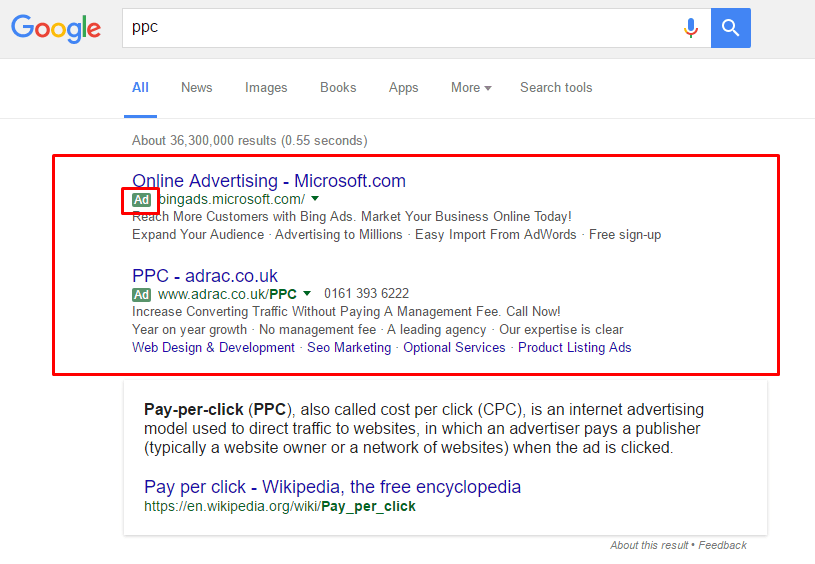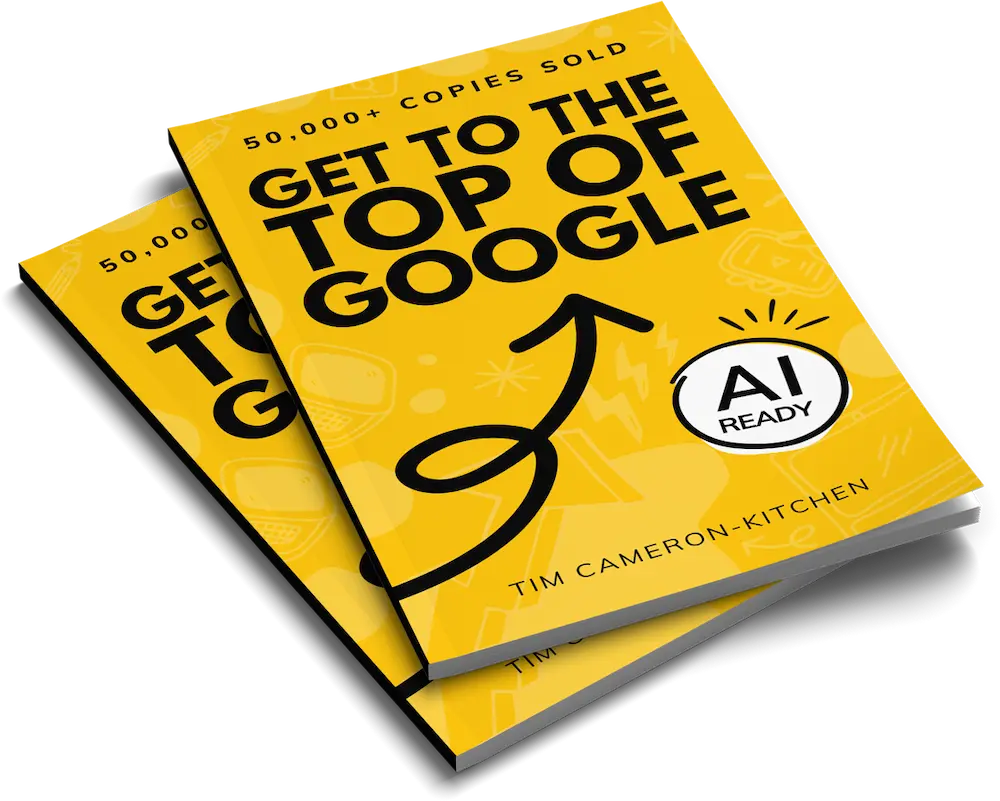
Get Weekly Marketing Tips
Join 30,000+ marketers and get the best marketing tips every week in your inbox
What Is PPC?
Pay-per-click Advertising (sometimes known as Paid Search Marketing) is a fast and effective way of getting your business or website shown at the top spot in search engines like Google. PPC ads are easily identifiable at the top and bottom of the search results by the ‘Ad’ flag shown below the ads main title.

Normally, results are ordered by Google and other search engines according to secret algorithms. Websites with a lot of traffic and engagement tend to rank highly, while websites with low traffic and low engagement end up at the bottom of the pile. These rankings are known as organic results.
PPC offers businesses a chance to skip the queue and turn up at the top, but there’s a fee. To get started with PPC, a website owner will sign up to a search engine’s personal bidding system, eg. Google Ads. Next, they’ll create a set of ads and choose the keywords that they’d like to target. In theory, this ensures that the ads are only served to people who might actually become a buyer. It’s called PPC because the website owner only pays when their ad is clicked on.
How PPC Works
When somebody performs a Google search, AdWords will then search all the correctly targeted ads where the keywords match the search query. Google will ignore any ads that are not correctly targeted and Google will decide which or the remaining ads to show based on their Ad Rank.
Ad Rank is formed by a combination of your keyword bid amount, the ad quality and the estimated impact that the ads format and extensions will have. In other words, Google wants to show good ads that are aimed at the right people. This makes business sense — if the ads were irrelevant and annoying, they would harm the searcher’s user experience.
The trick to PPC is keeping an eye on the competition. This is important because PPC is more expensive when the keywords are more competitive. For example, advertisers might be willing to spend a lot more on a keyword like “divorce lawyers London” because they know that people using those search terms are considering spending a lot of money. On the other hand, a keyword like “belly button fluff” might be very cheap because there aren’t so many buyers willing to fork out for belly button fluff.
A PPC campaign may have a great click through rate, an extremely low average cost per click, and still not lead to sales. If this is the case, it’s time to start looking at the bigger picture. PPC can bring traffic to your website, but if your website (or product) looks horrible, no amount of PPC will encourage them to buy. At this point, you should consider designing some PPC specific landing pages so that your potential customers have the best possible experience from the moment they land on your website.
If you have no idea why you website isn’t converting, our ninjas can tell you for free. We’ve done 4,000 no strings attached website reviews so far.
PPC, Google And Other Search Engines
So far we’ve been talking about Google because it’s the most popular search engine and the one that most small business owners start using. That’s not to say that there is no benefit to running a PPC campaign in other search engines. For example, a lot of great site traffic can also be acquired by using one of the smaller bidding systems such as Bing Ads. Although you may not get the same amount of traffic, you may find that the average cost per clicks can be considerably lower due to less competition.
Do I Need A PPC Campaign?
PPC is easily the fastest way to get your business appearing in the search engines. Most (if not all) businesses running a well-developed website can benefit from having some level of PPC. Even a very small business can reap the benefits of having an ad campaign running as it’s quick and you can get started with even a very modest ad budget.
The key question a business owner must ask themselves before taking the plunge is…
Request a free website and marketing review and our team will tell you how to improve your marketing.Is your marketing underperforming?


How Much Can I Afford To Invest In My PPC Campaign?
The good news is that it doesn’t cost much to get started with a decent PPC campaign. It is very possible for a small business campaign to be effectively optimised, spending as little as £200 per month. The bad news is that without strong PPC experience, your money can be spent very inefficiently. There is no such thing as a “perfect budget” for a PPC campaign. The amount that you should spend on PPC will be determined by a number of factors:
- The strength of the current competition.
- The cost per click of reaching a top 3 position for your keywords.
- The ability of your ads to convert customers.
These questions can be immensely difficult for a beginner to answer correctly and any mistakes could prove costly. Enlisting the support of PPC account manager will ensure that you are able to get the most out of your campaigns for almost any sort of budget.
Ongoing PPC Management
Putting in the effort to set up a successful PPC campaign is one thing, but without the constant management and optimisation, the success of a campaign can quickly take a turn for the worst. A PPC manager has the knowledge and skills necessary to ensure that your campaign stays successful. By continually refining ads (including split testing), honing down the more profitable keywords, adding negative keywords to ensure that each click is a valuable one and performing general bid optimisations, the assistance of a PPC manager can be a valuable asset to ensure that your PPC campaigns continue to be a valuable source of traffic for the lowest possible cost.
PPC success with Thinkplus looks like this…
- Expert Shield
Expert Shield was paying £26 per customer with a self-managed Google Ads Campaign. Thinkplus took over in January 2014, and by August their cost per conversion was £2.97 — a reduction in customer acquisition costs of 88.6%.
- DNUK
Within 2 weeks of managing their adverts, we halved their self-managed cost per click by adding negative keywords, automated rules and improving the ads. This represents an annual saving to them of £60,000.00 per annum. Swish!
PPC: what are the risks and rewards?
Running a PPC campaign does not come without risk. Whatever you do, don’t “set and forget” your PPC campaign as you could find yourself racking up some serious expenses! A technical knowledge of AdWords and other PPC bidding systems will all but eliminate the chances of a costly mistake being made. Here are just some of the reasons why PPC campaigns fail:
- Conversion/sales tracking not set up properly.
- Spending a huge budget on non-converting keywords without an understanding as to why.
- Ineffective campaign structures (this is more important than most business owners realise!)
- Blindly following all tips supplied by the AdWords dashboard… this is not always necessary if your campaign is correctly optimised and it may even cause you to end up spending more than intended.
There are many factors that a PPC manager will take into consideration that a self-taught PPC advertiser may not be aware of: Why aren’t my clicks leading to conversions? How can I improve my click through rate? Why isn’t my keyword populating a search even though I am paying the minimum bid amount needed for page 1? Whilst Google will always be there as a guide, there will always be unanswered questions like this that only a long time PPC Manager can assist with.
Enlisting the help of PPC manager can help take the stress out of managing PPC campaigns, leaving business owners to do what they do best!






















